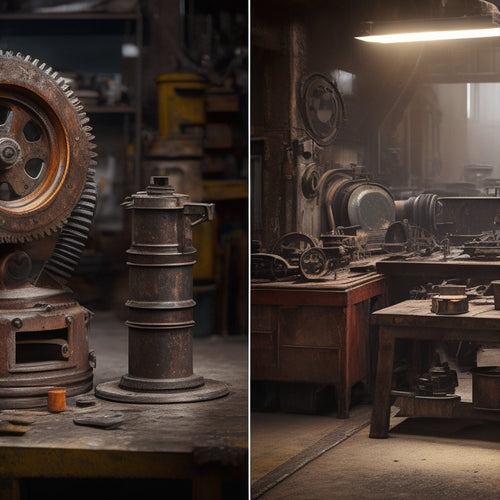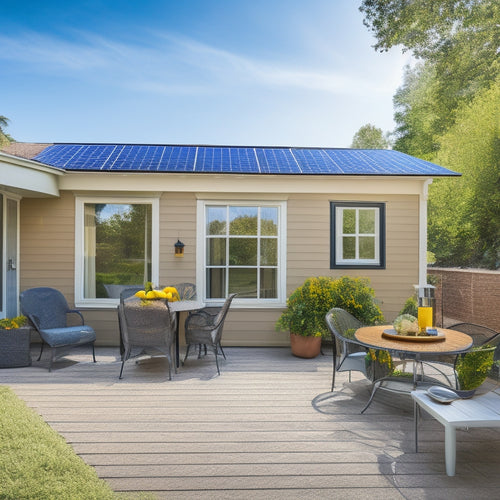
5 Best Solar Power Systems for Residential Use
Share
You're looking for the best solar power systems for your home. Top-rated brands like SunPower and Panasonic offer efficient energy conversion and thorough warranties. When selecting a system, consider features like advanced inverters, energy storage, and streamlined installation. Financing options, such as cash purchases, solar loans, and Power Purchase Agreements, can greatly impact costs. High-efficiency options like bifacial panels and perovskite solar cells are available, and proper installation requires careful assessment of your energy needs and budget. To find the perfect system for you, evaluate your options based on efficiency, cost, and warranty – and investigate the details that will help you make an informed decision.
Key Takeaways
- Top-rated solar panel brands like SunPower and Panasonic offer high-efficiency options with extended warranties up to 25 years.
- Residential solar systems with advanced inverters and energy storage capabilities ensure seamless energy production and monitoring.
- Cost-effective solar solutions include financing options, cash purchases, and Power Purchase Agreements with varying upfront costs and savings.
- High-efficiency solar power options like bifacial panels, perovskite solar cells, and concentrated photovoltaic systems enhance energy output and reduce costs.
- Proper installation and integration with existing electrical infrastructure are crucial for a successful and efficient residential solar power system.
Top-Rated Solar Panel Brands
Several top-rated solar panel brands are vying for your attention, each boasting unique strengths and advantages. When choosing the best brand for your residential solar power system, you'll want to take into account factors beyond just panel efficiency.
Look for brands that offer thorough installation tips, guaranteeing a seamless setup process. For instance, some brands provide detailed guides and videos to help you prepare your roof for installation.
Warranty comparisons are also vital in your decision-making process. Leading brands like SunPower and Panasonic offer industry-leading warranties, with up to 25 years of coverage on their products.
Others, like Tesla, provide a unique warranty that combines both product and performance guarantees. Be sure to research each brand's warranty terms and conditions to confirm you're getting the best protection for your investment.
Residential Solar System Features
Your solar power system's performance hinges on its features, which can greatly impact your energy savings and overall satisfaction.
When choosing a residential solar system, it's crucial to evaluate the features that will meet your energy needs and provide a seamless integration with your existing electrical infrastructure.
Here are the key features to look for in a residential solar system:
-
Efficient Energy Conversion: Look for systems with high-efficiency solar panels that can convert sunlight into electricity with minimal losses.
-
Advanced Inverters: Verify the system has a high-quality inverter that can optimize energy production, monitor performance, and provide real-time data.
-
Residential Energy Storage: Explore systems with energy storage capabilities, such as batteries, to store excess energy generated during the day for use during the night or power outages.
- Seamless Solar System Installation: Opt for a system with a streamlined installation process, minimizing disruptions to your daily routine and guaranteeing a smooth shift to solar power.
Cost-Effective Solar Solutions
With the increasing popularity of solar power systems, homeowners are now more concerned than ever about the cost-effectiveness of their investment. You're likely wondering how to make the most of your solar power system without breaking the bank. The good news is that there are several cost-effective solar solutions available to you.
One of the most significant factors affecting the cost of your solar power system is the financing option you choose. Here are a few options to evaluate:
| Financing Option | Upfront Cost | Monthly Savings |
|---|---|---|
| Cash Purchase | $15,000 - $20,000 | $100 - $150 |
| Solar Loan | $0 - $5,000 | $50 - $100 |
| Power Purchase Agreement (PPA) | $0 | $20 - $50 |
| Lease | $0 | $10 - $30 |
Additionally, you may be eligible for tax incentives, such as the Solar Investment Tax Credit (ITC), which can help offset the cost of your system. By exploring these cost-effective solar solutions, you can enjoy the benefits of solar power while keeping your wallet happy.
High-Efficiency Solar Power Options
Twenty years ago, solar panels were barely efficient enough to power a small household. Fast-forward to today, and you'll find high-efficiency solar power options that can meet your energy demands with ease.
Advances in solar panel technologies have led to increased energy output, reduced carbon footprint, and lower costs.
Here are 4 high-efficiency solar power options to evaluate:
-
Bifacial Solar Panels: These panels capture energy from both the front and back sides, increasing energy output by up to 25%.
-
Perovskite Solar Cells: This emerging technology boasts higher efficiency rates than traditional silicon-based panels, with potential for even greater gains in the future.
-
Solar Power Systems with Energy Storage: Pair high-efficiency solar panels with advanced energy storage solutions, like lithium-ion batteries, to store excess energy for later use.
- Concentrated Photovoltaic (CPV) Systems: By focusing sunlight onto a smaller area, CPV systems can achieve higher energy outputs and greater efficiency.
When selecting a high-efficiency solar power system, assess your energy needs, budget, and available space.
With the right system, you can maximize your energy output, reduce your reliance on the grid, and enjoy significant long-term savings.
Best Solar Inverters for Homes
The solar inverter is the brain of your solar power system, converting DC power from your panels into AC power for your home.
You'll want to choose the right one to guarantee maximum energy output and efficiency. There are three main solar inverter types: string inverters, microinverters, and power optimizers.
String inverters are the most common, connecting multiple panels in a series. Microinverters, on the other hand, are installed beneath each panel, providing more flexibility and monitoring capabilities. Power optimizers offer a compromise between the two, optimizing energy output at the panel level.
When selecting a solar inverter, consider factors like efficiency, durability, and compatibility with your panel array. Look for inverters with high efficiency ratings (>95%) and a long warranty (25 years or more).
Verify the inverter is compatible with your panel type and configuration. During inverter installation, tips to keep in mind include proper shading analysis, secure mounting, and easy access for maintenance.
A well-chosen and properly installed solar inverter will maximize your energy output and provide a smooth, reliable power supply for your home.
Frequently Asked Questions
How Long Does It Take to Install a Residential Solar Power System?
You're about to utilize the sun's energy, but first, you're wondering how long the installation will take. The installation timeline varies, but typically, the installation process takes 2-5 days for a standard residential system, depending on system size and complexity.
Can I Sell Excess Energy Back to the Grid?
You can sell excess energy back to the grid through net metering benefits, which allow you to generate credits on your utility bill; many energy credit programs also let you bank these credits for future use or even cash them out.
Are Solar Panels Resistant to Extreme Weather Conditions?
You're right to wonder if solar panels can withstand harsh weather; fortunately, they're designed to be incredibly durable, with rigorous testing ensuring they perform well in extreme weather conditions, such as hurricanes, hail, and blizzards.
Do Solar Panels Require Regular Maintenance and Cleaning?
As you bask in the radiant glow of your solar panels, remember that regular maintenance is essential to their sparkling performance. You'll need to clean them every 6-12 months to guarantee peak energy harvesting, which can enhance their lifespan by up to 20 years.
Can I Finance My Solar Power System Through a Loan?
You can finance your solar power system through a loan, exploring various solar loan options that offer financing benefits, such as lower monthly payments, tax incentives, and increased property value, making renewable energy more accessible.
Related Posts
-

Why Higher Upfront Costs Are Worth It
You pay a premium for high-quality, energy-efficient products, but they're worth it. With durability testing ensuring...
-

10 Tips to Buy Affordable Solar Panels Online
When purchasing affordable solar panels online, you'll want to research reputable retailers, compare prices, and chec...
-

Why Cities Need Smart Charging Infrastructure Now
You're about to experience a tidal wave of electric vehicles hitting your city's streets, and it's essential you're p...


